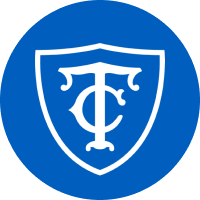A History of Information Instruction at Teachers College
Research Buzz
Introduction
The Reference and Reader Services unit of the Gottesman Libraries looks forward to the start of every semester with a full line up of research and library-use instruction for the Teachers College community. Like every other discipline, pedagogies centered on library instruction change. This post provides a birds eye view of the history of library services offered at Teachers College as evidenced by the holdings of the Libraries’ special collections and archives.
I forgo a strict chronological history in favor of a narrative by instruction format. The set of collections that comprise the library at Teachers College has been referred to by several names throughout its own history. At some point or another we have been known as the Bryson Library, the Teachers College Library, the Milbank Library, and now the Gottesman Libraries. When referring to a specific historical document I have chosen to use the name of the library as it was known at the time of that document's publication. When referring to the library generally and in contemporary accounts the current moniker Gottesman Libraries is used.
Consultations
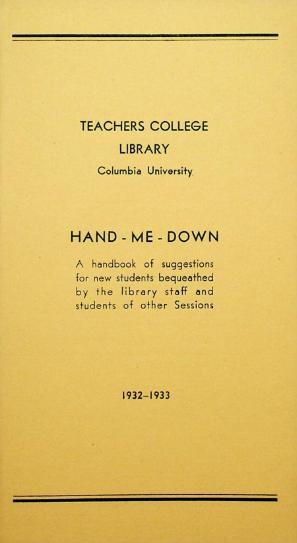
Hand-Me-Down. The Gottesman Libraries. RG 10. File 138 "Library Publications"
One-to-one consultations with students, faculty, and staff are the foundation of our instructional services. The 1932 pamphlet, “Hand-Me-Down” attests to this with the first section recommending that students make an “...appointment with the Library Consultant (2nd Floor) when you need guidance and instruction or assistance…”
The title of consultant rather than librarian implies that consultations were the primary or perhaps sole responsibility of this unit. Further investigation will be required but what is clear is that the Teachers College Library had established personal instruction on the use of libraries and its resources as a priority. This is reinforced by the mimeographed bulletin “The Library Consultant” published quarterly over 14 issues of the same decade as the aforementioned pamphlet.
Consultation support services would have likely been overseen by Professor Alexander Carter, a school administrator and library specialist who worked at Teachers College from 1921-1943. Professor Carter was appointed, in 1932, to the Library Consultants unit. Further study of his contributions to library instruction are warranted but, unfortunately, out of scope for this post. A broad overview of his role and impact at Teachers College is provided by Allen Forresta in the post linked here.
Bibliographic Guides
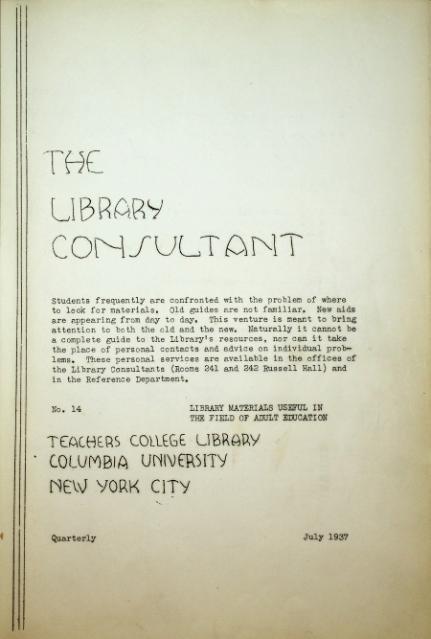
The Library Consultant. TC3 ZL224 no. 1-14
Vast amounts of research publications and the myriad formats of their production (print, microfiche, cd-rom, various visual and audio formats) present a preposterous sort of task to library users; how do you find relevant scholarly material in one’s field of study? The librarians at Teachers College have confronted this challenge from the very start, and have been innovators in helping users suss out their needs. Each issue of The Library Consultant, for example, is a guide of library resources for a specific field of study. Its contents would include a listing of bibliographies; secondary source materials such as books and current periodicals; reference materials, such as encyclopedias and dictionaries for practitioners of the selected disciple; and lists of recommended books on the subject.
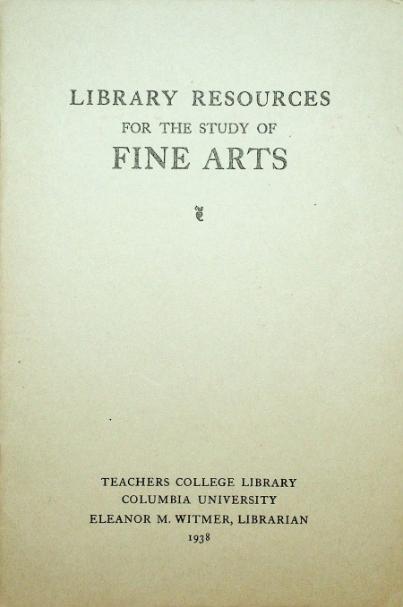
Library Resources for the Study of Fine Arts. The Gottesman Libraries. RG 10. File 138 "Library Publications"
Handbooks would be produced by staff at the Teachers College Library to supplement the above bulletin. Compiled by Eleanor Witmer, Librarian & Professor of Education, in 1938, “Library Resources for the Study of Fine Arts” identifies the struggle users may have in locating material:
Fine arts study demands access to such a wide variety of books and other print materials that they will not be readily located in any one division of the Library. These notes on the resources of Teachers’ College Library have therefore been prepared to serve students who wish to pursue their study without undue loss of time and effort.
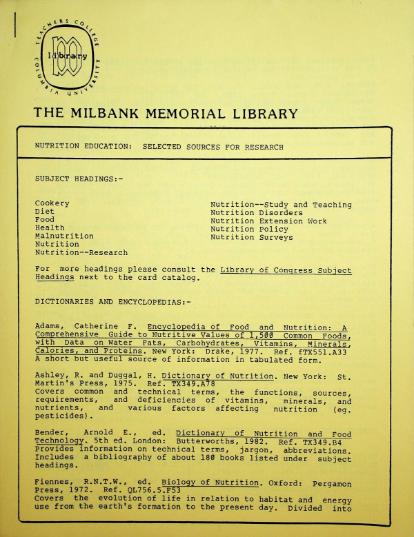
Nutrition Education: Selected Sources for Research. The Gottesman Libraries. RG 10. File 138 "Library Publications"
These types of publications continued, though without the charming decorative flourishes found in the 1930’s. As shown above in the bibliographic guide on nutrition education from 1970’s, here is a straightforward approach with no introductory material.
We now have digital equivalents of these types of publications. First through a series of digital blog posts and now through our research guides portal, which makes sharing and updating content more efficient. In addition to highlighting subject specific resources, the research guides also act as a framework for research methods and skills that should be inculcated in graduate-level researchers. In this sense they act as a supplement to the group instruction we conduct via our workshops.
Workshops
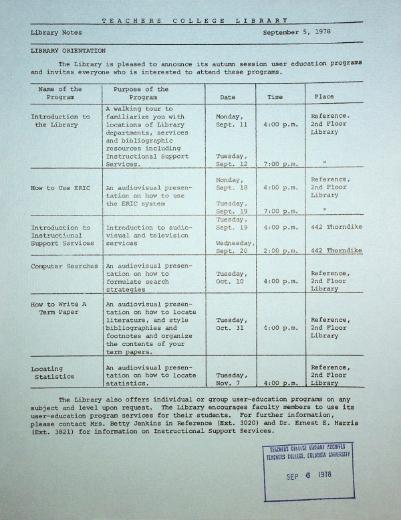
Library Notes: September 5, 1978. The Gottesman Libraries. RG 10. File 138 "Library Publications"
Tracing the evolution of library instruction workshops reveals a history of innovation in information storage technologies, and also demonstrates the importance the Gottesman Libraries places on user access. A review of two consecutive issues of Library Notes, an occasional newsletter published by the Teachers College Library, will demonstrate these facts. The September 5, 1978 issue promotes a workshop on conducting computer searches for formulating search queries. Another workshop discusses how to use ERIC, an education-focused database. In 1978 this was most likely accessed via microfiche.
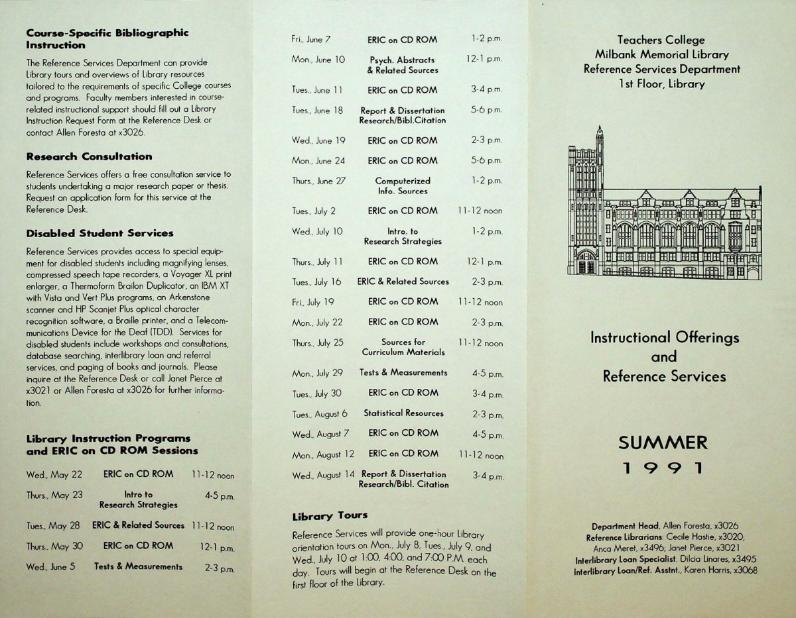
Instructional Offerings and Reference Services: Summer 1991. The Gottesman Libraries. RG 10. "Handbooks and Services"
Later, in 1991, a similar handout encouraged students to take workshops on ERIC, this time via CD-ROM. ERIC is still utilized by education scholars today, where one can access it freely via the internet. It is fascinating to see the evolution of information storage and retrieval through a singular database. In the face of these increasingly complex storage technologies, that this evidence is traced through paper records - itself the information storage medium of choice for millennia - only confirms that substrate’s longevity.
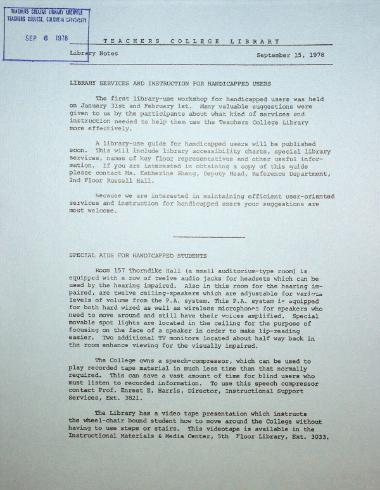
Library Notes: September 15, 1978. The Gottesman Libraries. RG 10. File 138 "Library Publications"
Equity in access played an important role at this time as well, as seen in the next issue of Library Notes from September 15, 1978. Presaging the Americans with Disabilities Act of 1990, the newsletter documents the library’s first workshop centered on services and access for users with disabilities. In addition to offering an explanation of accessibility services the workshop operated as a forum where participants offered suggestions on what would be of most help to them. The newsletter goes on to highlight equipment and technological aids to assist those with auditory, visual, or mobility impairments.
Our workshops today continue to consider our community’s needs. We offer hybrid workshops that focus on foundational research skills along with a series of workshops on content geared toward those wanting to advance those skills. We adapt these workshops to address the popularity of certain research formats, like the literature review. And highlight tools, skills, and software to assist when creating this research. Furthermore we still conduct accessibility workshops, highlighting the newest publication formats and tools to support our mission of equity of access to research materials by our community of users.
Workshop content is undergirded by our commitment to the development of information literacy. This, too, however is not a new endeavor but one that has a history at the Gottesman Libraries.
Information Literacy
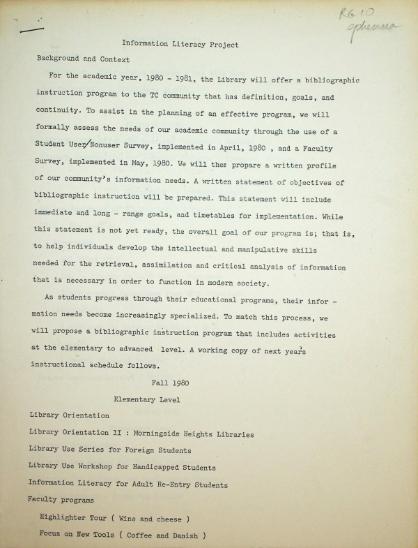
Information Literacy Project. The Gottesman Libraries. RG 10. File 138 "Handbooks and Services"
Information literacy as a concept has evolved since its introduction to print in 1974. Generally the subject is concerned with the development of an information user's ability to search, access, create, and understand bias inherent information sources. We see that there were attempts to incorporate information literacy instruction from a pilot project proposal and plan for the 1980-81 academic year.
The proposal includes information instruction sessions geared toward doctoral students; students re-entering college after a long gap in academia; faculty programs; and information literacy tuned toward nursing education and psychology programs. While it is unclear if the proposal ever moved past the pilot phase or what, if any outcomes were achieved, we see that the Librarians at Teachers College have been at the forefront of this practice.
Library Instruction Today and in the Future
Today we incorporate information literacy in all our instructional offerings. Utilizing the support of our professional associations, such as the Association for College Resource Libraries (ACRL), we can create and share lesson plans for classroom sessions. Offer engaging information literacy activities in our workshops which aim to improve the research
practices and learning dispositions of our users as defined in ACRL Information Literacy Framework . Our consultations provide an individualized approach to improving information literacy based upon one’s current need. Finally, our research guides supplement all our instruction services by providing reference to the above instruction along with bibliographic recommendations.
Questions swirl about the preservation of our born-digital library instruction materials. Afterall, this brief history of instruction at the Gottesman Libraries could only be compiled through a combination of physical ephemera and digitized physical material. Long-term preservation is being worked on by the Special Collections and Archives unit of the Libraries and will be hosted on Teachers College Digital Collections, our portal for digitized materials. This, in turn, will ensure we can continue to follow the evolution of library instruction at Teachers College Gottesman Libraries.



